5 Best Electric Pressure Washers of 2021 – Reviews & Top Picks
Last Updated on January 4, 2021 by Mark Johnson
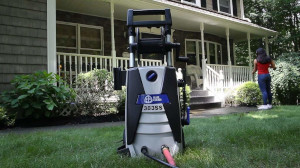
You may think that power washers are just for school janitors and unlucky city maintenance people assigned to clean up graffiti, but they have plenty of uses at home as well. You may also think that because they’re targeted at commercial clients, you can get one at an affordable price.
You would be wrong on both counts. You can get an affordable, easy-to-use power washer that will make cleaning your vehicles, fence, sidewalk, and even your house a quick and satisfying task. However, it’s not always easy to shop online. You can’t always tell what part of a product description is useful information and what is just marketing fluff.
We want you to be able to buy with confidence, which is why we’ve assembled these reviews of the best electric power washers of 2021. We’ve also included a buyer’s guide, so you can learn everything you need to know about these tools before you buy.
Our Top 5 Picks of 2021
| Model | Price | Weight | Editor Rating |
|---|---|---|---|
Sun Joe SPX4000 2030 PSI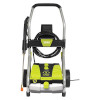 (Top Pick) | Check Price | 28 lbs | 4.3/5 |
Karcher K5 16033610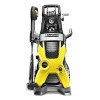 | Check Price | 32 lbs | 3.5/5 |
Greenworks 1600 PSI GPW1602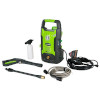 (Best for the Money) | Check Price | 17 lbs | 4.1/5 |
AR Blue Clean AR383SS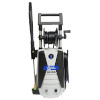 | Check Price | 33 lbs | 4.1/5 |
COSTWAY 1400PSI 2000W 1.6GPM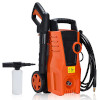 | Check Price | 14 lbs | 3.5/5 |
5 Best Electric Pressure Washers – Our Reviews
1. Sun Joe SPX4000 2030 PSI – Top Pick
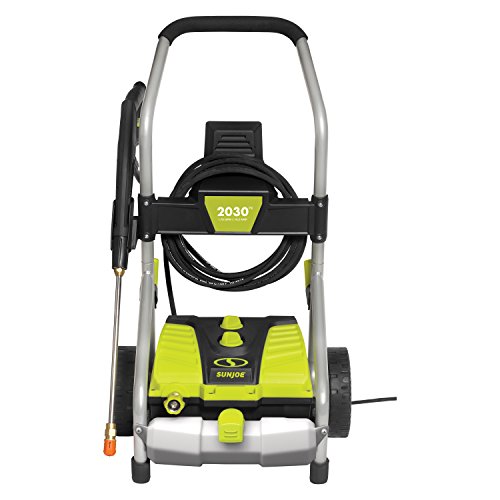
The Sun Joe SPX4000 2030 PSI pressure washer is a good choice for anyone who has serious power washing needs or wants to get their small jobs done faster. You can use it in high power mode, which gives you up to 2030 PSI to solve the toughest jobs, or in lower power mode, which gives 1450 PSI, a better power for cleaning dirty or delicate surfaces. It comes with easy-glide wheels, which makes it easy to move around and reposition during large projects. It also comes with five quick-connect nozzles, which allow you to customize the spray to the task at hand.
It also comes with the Total Stop System, which automatically shuts off the pump when the trigger is not depressed. This ultimately extends the washer’s life since it doesn’t work when you’re actively cleaning. The only downside to this model is that it comes with a fitting that is one millimeter larger than those used by most other brands, which means that if you’re looking to use aftermarket parts, you’ll have to buy an adaptor to get them to work. However, this is a great pressure washer and has the power to get tough jobs done fast.
- Up to 2030 PSI
- Easy-glide wheels
- Five quick-connect nozzles
- Total Stop System extends life
- Not compatible with other brands
2. Karcher K5 16033610 – The Runner-Up
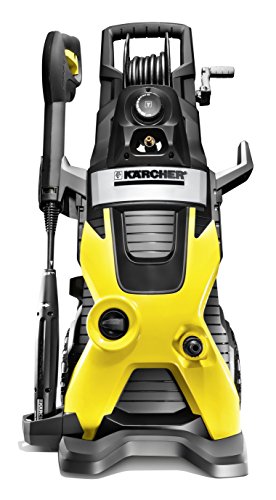
The Karcher K5 Premium could easily be the first-place entry on our list if it were not for the Sun Joe. It produces up to 2000 PSI, making it very similar in power to our top model. It also comes with a cool hose reel, which makes it fast and easy to retract the hose when you’re done. That doesn’t sound like a big deal, but it will save you a lot of time in the long run. It also includes two wands. The first features a variable-power spray that you can adjust on the fly by twisting the handle, while the other is designed to give maximum cleaning power at all times.
Perhaps the coolest feature on this model is its water-cooled induction motor, which uses the water that will be used for cleaning to keep the motor cool. Cool motors don’t experience as much wear on their parts, and consequently last much longer. What ultimately knocks this model out of first place is its price. It’s nearly as good as our top model, but costs far more, which is too bad. Otherwise, this is a great model that will meet, and exceed most people’s needs.
- Up to 2000 PSI
- Hose reel
- Two wands
- Water-cooled induction motor
- Price
3. Greenworks 1600 PSI GPW1602 – Best for the Money
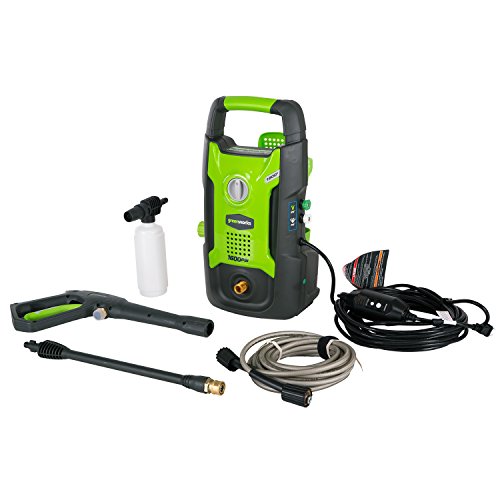
The Greenworks 1600 PSI GPW1602 is our choice for best for the money. It comes with 1600 PSI of power, which is enough for most light- and some medium-duty tasks. While it’s not as powerful as our top two models, you can get it for a fraction of the price, which makes it a good deal if you’re looking for a pressure washer for your car or other light-duty tasks around the house. This model also includes a soap applicator, which speeds up the car-washing process even further, as you’ll no longer have to apply soap by hand before cleaning.
It comes with two easy-attach tips. The 25-degree tip is useful for cleaning dirt and grime off of sidewalks or concrete or brick walls, while the gentler 40-degree tip is good for cleaning off cars, or other situations where you want to make sure that the paint stays intact. What keeps this model out of the top two is that it has inconsistent quality control. Most models work well and last a long time, but sometimes people receive a unit that is defective or quickly becomes that way. If you’re shopping on a budget, this is the model for you.
- 1600 PSI
- Price
- Soap applicator
- Two tips included
- Inconsistent quality control
4. AR Blue Clean AR383SS
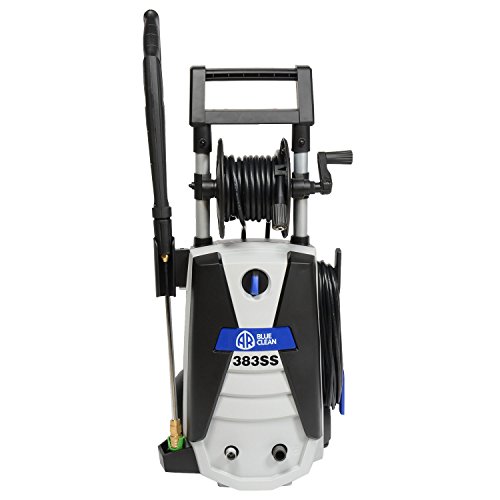
The AR Blue Clean AR383SS has some potential, but ultimately has enough flaws to drop it to fourth on our list. It comes with four nozzles, including a 25-degree, 0-degree, rotary, and soap nozzle. That makes it a very versatile buy, and more aimed at power cleaning than other options on our list. It comes with a 35-foot power cord, which is five to ten feet longer than the cords found on other models. It also includes an integrated detergent tank, which solidifies it as a contender.
However, it has some problems that will make you not like using it. The wheels are stiff, and with the weight of water and the hoses, it can be a pain to move around. Instead of rolling, you’ll sometime have to drag it. It also claims to have 1900 PSI, but most people think that it clocks in far lower than that. Since the power is underwhelming, most people aren’t going to like using this model. If the price was much lower, it might have potential as a bargain model, but given that it costs about what our top model costs, it can rise no higher than fourth on our list.
- Four nozzles
- 35-foot power cord
- Integrated detergent tank
- Stiff wheels
- Underpowered
5. COSTWAY 1400PSI 2000W 1.6GPM
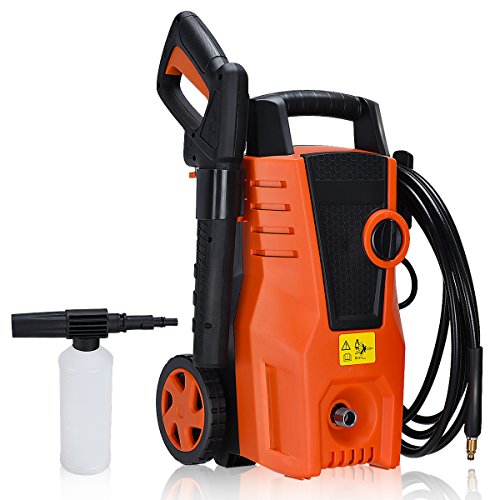
The COSTWAY 1400PSI 2000W 1.6GPM comes with more problems than potential and consequently drops to the bottom of our list. It’s an easy model to assemble, which should get you from unboxing to cleaning in a matter of minutes. It also comes with a soap dispenser, which is a nice feature to have. However, 1400 PSI is pushing the limits of the term “power washer.” If you’re really looking to get something clean, you’re going to want more power, and that goes double if you want to get the job done quickly and efficiently.
This model also uses nonstandard fittings, which means that you’ll have to buy an adaptor if you want to use an aftermarket nozzle or hose. Those two parts are the cheapest and easiest way to get more efficiency out of a power washer, so having to buy an additional adaptor drives the value down. It also sometimes ships without the requisite adaptor to connect your garden hose to the unit, so you may have to run to the store to get that part before you can start. Overall, this model doesn’t provide good value for the price, even though it’s the cheapest one on our list.
- Easy assembly
- Includes two nozzles
- Includes soap dispenser
- 1400 PSI
- Not compatible with other brands
Buyer’s Guide
Hopefully, our reviews already have you thinking about the features you want to have in your next electric pressure washer. If you’re still not sure which model is right for you, you’ve come to the right place. This buyer’s guide is packed full of useful information about electric power washers, and it’s designed to teach you everything you need to know before you buy. So, if you’re looking to become an educated buyer, or you haven’t bought a pressure washer in a long time, this is a good resource to use to make sure that you’re up to speed and ready to buy.
Electric vs Gas (portability, cost of operation, noise)
The biggest decision you’ll have to make before you buy an electric pressure washer is whether that’s the model that you want or not. Gas-powered pressure washers do have upsides over electric models, though they’re not universally better.
For instance, gas models are almost always more powerful than electric ones. Electric pressure washers top out at just over 2000 PSI of pressure, which is the entry point for gas models, which can provide as much as 2800 PSI. Depending on the model, that might mean that a gas pressure washer is twice as powerful as a given electric one, which can have a PSI as low as 1300.
However, you can have too much power. If you’re trying to clean something and not strip the underlying paint off, then you won’t need 2800 PSI of pressure. For example, weaker electric and gas models are better for cleaning cars, as their paint coats can be fragile. Furthermore, if you’re cleaning a wooden fence or deck, the strongest gas-powered models can actually splinter the wood, damaging your investment, in addition to just stripping off the varnish.
On the other hand, if you’re trying to clean graffiti or other kinds of paint off a concrete surface, it’s hard to go wrong with the strongest model you can find. If it’s too weak, the model won’t be able to get the paint off or will leave obvious residue behind that looks crummy. But, worst of all, it will be slow, requiring multiple passes to get good results. Speed is the biggest advantage that more powerful models have over less powerful ones. You’ll be able to do more with just one pass, and each pass will be faster since the extra pressure will make a big difference.
However, that’s just the differences between gas and electric models in terms of power. There are also significant differences in terms of portability. Gas models don’t have a power cord, and that means you can take them anywhere, and not worry about finding a nearby electric outlet. This isn’t that big of a deal, because you have to have access to water, which is harder to come by, but it’s still something worth considering.
Gas engines tend to be far heavier than electric engines, which means that if weight is a concern for you, you’re better off going with an electric model. Electric models are also far quieter. The loudest electric models peak at about 78 decibels when running. When the trigger isn’t depressed, many models automatically stop the engine, which means there’s no sound at all, making them far quieter on average than gas models.
Gas models are 85 decibels loud, at minimum, and can be far louder. That means you’ll probably have to wear ear protection with gas models, and while you might still want to with electric models, it’s not strictly necessary.
Gas models also have a higher cost of operation over time, as they require gas to run. Whether you live in an area where gas is relatively cheap, electric models will generally cost far less to operate in the long run.
Make sure you keep the power, portability, noise, and cost of operation in mind when you’re deciding on a gas or electric model, and it will be easy to figure out which kind is right for you.
Nozzles
There are many different nozzles that come with electric pressure washers, and different models include different amounts and types. If you want to make sure that you get a model that can take care of your pressure washing needs, you not only want to get one with enough power but also with the right nozzles to get the job done.
Zero-degree
The zero-degree nozzle isn’t often included with electric pressure washers. That’s because it’s designed for the toughest removal jobs and thus is more suited to inclusion with more-powerful gas models. However, you’ll still occasionally find them included with an electric model.
They’re called “zero-degree” because the water is focused into a very concentrated stream, giving the highest pressure available from a standard nozzle. They’re typically used for removing stains and paint from concrete or metal, and they’re likely to splinter wood or siding, so you should avoid spraying those with a zero-degree nozzle.
15-degree
The 15-degree nozzle puts out the same amount of water as the zero-degree nozzle, but it spreads that water out over an arc that is 15 degrees wide. That means it’s putting out less pressure on each individual spot in the arc, which means it’s far less likely to splinter wood.
It’s mostly used for tough cleaning jobs or surface preparation. For instance, if you’re trying to clean mildew or really tough dirt spots off of rocks, walls, or sidewalks, this should be your go-to nozzle. It can also be used to prepare surfaces for painting, so it’s a possible option for stripping paint or varnish off a fence or deck.
25-degree
The 25-degree nozzle spreads the water out even further than the 15-degree nozzle and thus is a gentler nozzle. It’s a good choice for gentler cleaning tasks. For instance, if you’re trying to clean dirt, grime, or mildew off a fence or deck, this is a good nozzle to choose, since it’s less likely than the other two nozzles to strip the paint or varnish as well. It also features a wider arc, so you’ll get the job done faster.
You can also use it on sidewalks or driveways to clear mud or leaves. If you’re looking for a good general-purpose cleaning nozzle, the 25-degree nozzle is a good choice.
40-degree
The 40-degree nozzle is best for cleaning situations where you want to protect the underlying paint. Consequently, its best application is cleaning vehicles, as it packs enough power to wipe away the grime that builds up without being strong enough to chip the sensitive paint underneath. It’s also a safe nozzle for just about any kind of cleaning task, so you could use it on siding, a fence or deck, or concrete surfaces, but it may not have the power to cut through tough stains.
Even if it does, you may find that you have to go over the same areas multiple times, so you may be better off in those situations if you use a more focused nozzle.
The detergent nozzle
The detergent nozzle is designed as a low-pressure detergent-applying nozzle. Some pressure washers feature an internal tank for detergent, and this nozzle is the one to use when you want to coat a tricky surface in soap before washing. Others include a detergent nozzle that features a tank for detergent on the nozzle itself. Neither works better than the other, but the nozzles with the container on the nozzle are more unwieldy, while the pressure washers with an internal detergent tank are a bit bulkier than their counterparts.
You can also buy long-range detergent nozzles, but they’re rarely included in the same package as a pressure washer, as few people will have a use for them, so you’ll have to buy them separately.
The rotating nozzle
Rotating nozzles are zero-degree nozzles with a twist—literally. These nozzles spin the tightly-focused water current, which greatly increases its power. If you need a nozzle for the absolute toughest cleaning jobs, the rotating nozzle is a good choice. All that extra power greatly reduces the amount of time that you would spend on a job relative to a zero-degree nozzle
Which pressure washer is right for you?
The most important things to keep in mind when shopping for a pressure washer are whether you need gas or electric, which types of nozzles you need, and how you can get the best value for your money. While gas-powered pressure washers are more powerful, electric models are lighter and have a lower cost of operation over time.
You’ll also want to figure out what projects you’re likely to tackle soon. If you’re only going to do one thing with your pressure washer, then you should be fine buying a pressure washer that only includes one or two nozzles, as long as it has one that you can use. However, if you think you might end up doing a lot of different projects, then you will be better off buying a set that comes with multiple nozzles.
Once you’ve answered those questions, it’s a good idea to create a short list of models that meet your needs. Models on that list will all provide good value for your money since they meet your needs, but the cheapest one on that list will provide the best value since it meets all your needs, but you can get it at the lowest price.
Conclusion
The Sun Joe SPX4000 2030 PSI pressure washer is our top model, due to its great power, easy-glide wheels, and quick-connect nozzles that make using it a blast. The Karcher K5 Premium comes with up to 2000 PSI, a useful hose reel, and a water-cooled induction motor that extends its life, but its high price costs it first place. The Greenworks 1600 PSI GPW1602 provides the best value for the money on our list and comes with a soap applicator and two tips for you to choose between, all available for a low price. The AR Blue Clean AR383SS comes with a great 35-foot power cord, four nozzles, and an integrated detergent tank, but its stiff wheels and lack of power mean it takes fourth place. While the COSTWAY 1400PSI 2000W 1.6GPM has easy assembly and includes two nozzles and a soap dispenser, it only has 1400 PSI and isn’t compatible with other brands, which earns it last place on our list.
We hope that our reviews and buyer’s guide have helped you learn about electric power washers. Armed with this information, you should be able to find the model that is right for you.
